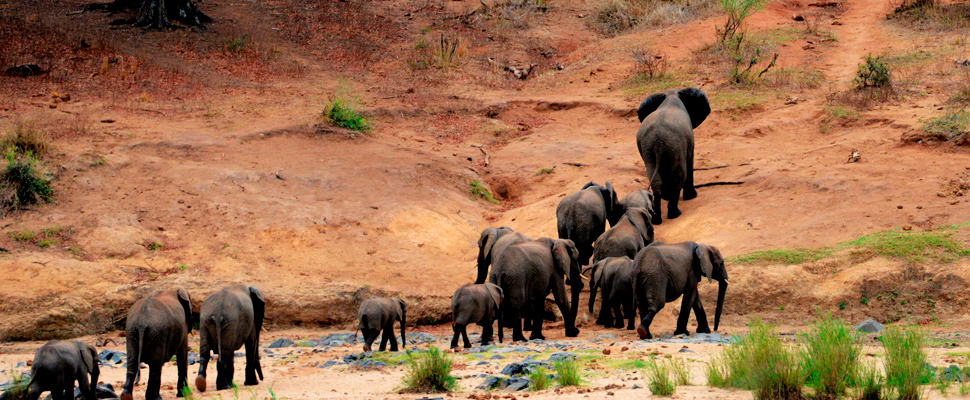Is God to blame for the mass extinction of species on earth?
'That the world is going to end with climate change,' say some. Nothing more false than this, the world is not going to end, the planet will continue its course, without us humans as species within its biodiversity and obviously while we devastate our species, we annihilate many others.

Herd of elephants in a mountain. / Photo: Pexels – Reference Image
LatinAmerican Post | Alberto Castaño
Listen to this article
Leer en español: ¿Es Dios el culpable de la extinción masiva de especies en la tierra?
The human species has always been an egotistical and presumed species, which since its origins, at least those narrated by Catholicism, bases its existence as if it were supposedly a species superior to the others that cohabit the planet.
In a version of the Bible, the version of Reina Valera Gómez, reads: “And God blessed them; And God said to them: Fruit and multiply, fill the earth and subdue it, and rule over the fish of the sea, and over the birds of the heavens and over all the beasts that move upon the earth. ”
Sojuzgadla and señorread, what a pair of such opportunistic and omnipotent terms, as if the lives of animals and other creatures were our property.
But in another version of the Bible, in the Latin American New Bible version, it says something worse: “God blessed them and said: 'Be fruitful and multiply. Fill the earth and subdue it. Exercise dominion over the fish of the sea, over the birds of the sky and above all living being that moves on the earth'”.
Submit and dominate, two verbs worse than the previous ones that attribute to man all power and property over other species and that being religiously conferred by the sacred book of various religions, it is assumed that "submit and dominate" are above "harmonize, live together, coexist, understand, protect, care, and preserve".
Also read: COP25 started and countries will have to move up a gear
Currently, one in four species of fauna and flora that inhabit the planet, along with the human species, are threatened by extinction. 40% of amphibians, 34% of conifers, 33% of corals, 31% of sharks and rays, 27% of crustaceans, 14% of birds and species with which we have more affinity because, at Like us, they are born from a mother who carries them in their guts for months and then breastfeed them. Threatened mammals are 25% of all existing on earth.
The above, according to a full UN report that was prepared by scientists who used more than 15,000 reference materials for three years and was presented in a 1800-page report by the Intergovernmental Science-Policy Platform on Biodiversity and Ecosystem Services, IPBES, for its acronym in English.
With such a mentality, which drives us to rule, subdue, and dominate, it is hardly obvious that one million species of plants and animals are in danger of extinction, if we add that just fifty years ago, in 1970 we were almost 3,700 million human inhabitants on earth and today we are more than double, almost 9,000 million. More than twice as many people submit and dominate.
And there are equally scary figures if we evaluate the impacts that humans generate to our overwhelming passage through the different regions of our planet. By the year 2000, according to the same UN, there were barely 13% of the forests and wetlands that existed on the land in 1,700 and urban areas have doubled since 1992 to date but 70% of the poor population in the planet lives in rural areas and depend strictly on biodiversity to survive.
Faced with this avalanche of data, figures, and statistics, there is nothing left but to ask God to illuminate the path of millions of species that are endangered by human interpretations in reference to the orders given by God.
However, for more years than anyone could think, men themselves are questioning the abuse of natural resources. In ancient Greece, Plato lamented about the state in which the land was left after grazing. "What remains now is, so to speak, the skeleton of a body wasted by disease: the rich and soft earth has been taken away and only the bare frame of the district remains."
However, then there was a setback thanks to the hegemony of the Catholic church in Europe because before the 18th century a contemplation of nature was considered a pagan practice. But in other parts of the world, where "civilization" had not arrived and where only "savages" lived, another was the picture.
The indigenous peoples of the Kolosh and Haida group in what we know today as Alaska and Canada had rules and times of closure for the fishing of red salmon decreed by the elders of these cultures. The Zenúes in Colombia knew perfectly how to develop terrace-based agriculture, taking advantage of flood and dry season each year without over-exploiting ecosystems or displacing any species.
Also read: Sperm whale stranded in Scotland sets world alarms
Other religions such as Hinduism, Islam, Buddhism, and even Taoism, lavish harmonious coexistence with Mother Earth and our "brothers" plants and animals, as one of the saints of the Catholic Church, St. Francis of Assisi, said, who went ahead of his time promulgating respect for nature.
And it is not the only example in the Catholicism of environmental awareness and rational use of natural resources, in the same sacred book in which the verbs submit, dominate, subdue and rule are mentioned, there is also a separate section in which God commands Moses let the land rest from cultivation activities every seven years.
It is clear that it is not God, composer of every breath of life of every species of plant and animal on earth, who has sent us to destroy his creation, it is clear that it is each of us human beings who have made a banal interpretation of the orders given.
According to the extensive report of the IPBES on the decrease of biological diversity on the planet, we still have time to curb this trend before it is irreversible, but this will, as the report says, be subject to a "transformative change". Will we continue to blame God?





